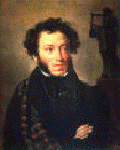June 6: Churches and Dueling
Alexander Pushkin (1799)
It was on this date, June 6, 1799, that the greatest Russian poet and the founder of modern Russian literature, Alexander Sergeyevich Pushkin (Алекса́ндр Серге́евич Пу́шкин), was born in Moscow. His great-grandfather, Hannibal, was a black African émigré who had served Peter the Great. His family was aristocratic but poor. Nevertheless, Pushkin managed to acquire an education at the Imperial Lyceum (1811-1817). While there, he began writing his first major work, Ruslan and Ludmila (Руслан и Людмила), a fairy story in verse based on Russian folk tales his grandmother had told him – in French.
At age 18 Pushkin accepted a staff position in the ministry of foreign affairs. But three years later (1820), the circulation in manuscript of his poem, Ode to Liberty, which included a severe criticism of religion, nearly caused him to be banished to Siberia. Instead, he accepted an inferior post, at Kishinev in southern Russia. This is where his real education began: Pushkin studied the poetry of his contemporaries, Byron and Goethe, and the writings of Voltaire.
While in exile, Pushkin began his masterpiece, Eugene Onegin (Евге́ний Оне́гин), a novel in verse that was finally published between 1823 and 1831. The novel features a duel between his characters, Lensky and Onegin, over a woman, Olga. His language defies easy translation, yet Pushkin's writing created Russian literature as it is known today. Dozens of his proverbs remain in common use. On the basis of his works, Pushkin is recognized as the greatest poet Russia has yet produced, and is a rallying figure of Russian pride.
In Moscow he met, and in 1831 married, the beautiful 16-year-old, Natalia Goncharova. Pushkin was twice her age. Rumors of Natalia's affairs afflicted Pushkin. She was seen with the French Baron George-Charles Dantes once too often at social functions, so Pushkin felt compelled to challenge Dantes to a duel on November 16, 1836.
Dueling was one of the more monstrous innovations introduced after Europe was compelled to adopt Christianity. So much for the claim that Christianity tamed the passions of the barbarians! The practice was not confined to men: in the Middle Ages, women fought their own duels — sometimes against men. In 1165, Pope Alexander II, instead of condemning duels, simply forbade wounded priests from saying Mass. If anything, the practice expanded during the Age of Chivalry. Although the Freethinker Voltaire condemned dueling, as late as 1830 London newspapers carried advertisements for how-to books on dueling.
Spain, France, Britain, Ireland, Russia, Germany and the rest of the Christianized world had their own longstanding traditions of settling insults to honor through personal combat — and no gentle Galilean stood in their way. England tried to ban dueling in 1712 and failed. Napoleon had suppressed dueling in France, but the clerical-royalists restored it. In the US, perhaps the most famous duel was on July 11, 1804, when Aaron Burr shot Alexander Hamilton.
Dueling was not just about blood for honor. This particular duel extinguished a brilliant poet's life, thus shortening both life and art: Alexander Pushkin, shot on a snow-covered field outside of St. Petersburg, died from his wounds two days later. It was 10 February 1837, and he was 37. Had Pushkin been less proud – had he lived even as long as Shakespeare, to whom he is equal in talent – what great works might he yet have created? A monument stands in the very center of Moscow where, on this date each year, people gather to honor the memory of Alexander Pushkin, cut down by a bullet that no creed tried to stop.
Originally published June 2003 by Ronald Bruce Meyer.


